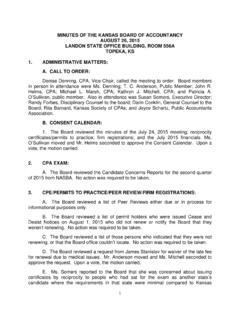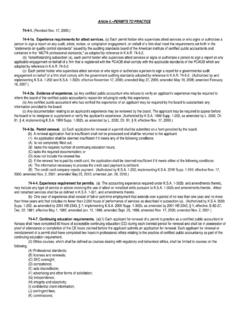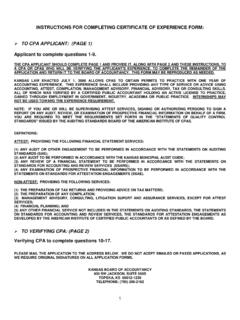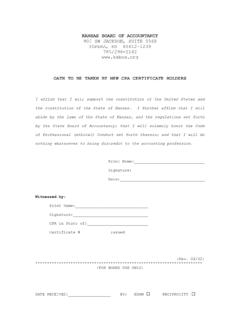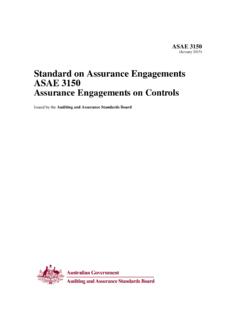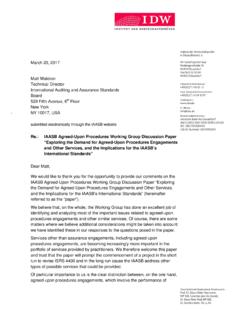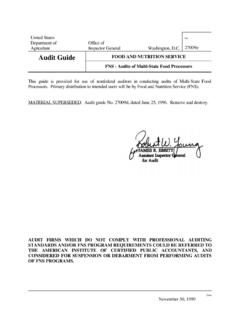Transcription of Article 5.--CODE OF PROFESSIONAL CONDUCT Part …
1 Article OF PROFESSIONAL CONDUCT Part , INDEPENDENCE, INTEGRITY AND OBJECTIVITY, COMMISSIONS AND REFERRAL FEES, CONTINGENT FEES 74-5-2. Definitions. Each of the following terms, wherever used in this Article of the board s regulations, shall have the meaning specified in this regulation: (a) AICPA means American institute of certified public accountants. (b) AICPA PROFESSIONAL standards means the standards specified in this subsection, including definitions and interpretations, published by the AICPA, which are hereby adopted by reference. As used in the following AICPA PROFESSIONAL standards, member shall mean a person or firm subject to the board s regulation: (1) auditing standards--AICPA (clarified) in AICPA PROFESSIONAL standards, volume 1, pages 37-1364, except pages 1279-1285, as in effect on June 1, 2016, and statement on auditing standards no.
2 132, the auditor s consideration of an entity s ability to continue as a going concern, dated February 2017; (2) statements on standards for attestation engagements in AICPA PROFESSIONAL standards, volume 1, pages 1373-1705, as in effect on June 1, 2016; (3) attestation standards--AICPA (clarified) in AICPA PROFESSIONAL standards, volume 1, pages 1727-2095, as in effect on June 1, 2016; (4) statements on standards for accounting and review services [clarified] in AICPA PROFESSIONAL standards, volume 2, pages 2719-2882, as in effect on June 1, 2016, and the following statements issued after June 1, 2016: (A) Statement on standards for accounting and review services no. 22, compilation of pro forma financial information, except the three unnumbered pages before the table of contents, issued September 2016; and (B) statement on standards for accounting and review services no.
3 23, omnibus statement on standards for accounting and review services--2016, except the six unnumbered pages before the table of contents, issued October 2016; (5) code of PROFESSIONAL CONDUCT in AICPA PROFESSIONAL standards, volume 2, pages 2883-3076, as in effect on June 1, 2016, except for the following sections in Part 1: (A) Section , form of organization and name ; (B) section , partner designation ; (C) section , a member s responsibility for nonmember practitioners ; (D) section , attest engagement performed with a former partner ; (E) section , alternative practice structures ; and (F) section , use of a common brand name in firm name ; (6) statements on standards for valuation services in AICPA PROFESSIONAL standards, volume 2, pages 3293-3344, as in effect on June 1, 2016; (7) consulting services in AICPA PROFESSIONAL standards, volume 2, pages 3345-3350, as in effect on June 1, 2016; (8) quality control in AICPA PROFESSIONAL standards, volume 2, pages 3353-3386, as in effect on June 1, 2016; (9) standards for performing and reporting on peer reviews in AICPA PROFESSIONAL standards, volume 2, pages 3387-3588, as in effect on June 1, 2016; (10) tax services in AICPA PROFESSIONAL standards, volume 2, pages 3589-3630, as in effect on June 1, 2016.
4 And (11) personal financial planning in AICPA PROFESSIONAL standards, volume 2, pages 3639-3654, as in effect on June 1, 2016. All definitions included in the standards adopted in this subsection shall apply only to the documents adopted by reference. (c) Audit means an independent examination of financial information or assertions of any entity, regardless of profit orientation, size, and legal form, if the examination is conducted to express an opinion thereon. (d) Board means Kansas board of accountancy. (e) Certified public accountant and CPA mean any of the following: (1) A holder of a Kansas certificate; (2) a person practicing certified public accountancy under the authorization to practice as provided in 1-322 and amendments thereto; or (3) a firm.
5 (f) Compilation shall have the meaning specified in 1-321 and amendments thereto. (g) Firm shall have the meaning specified in 1-321 and amendments thereto. (h) Generally accepted accounting principles and GAAP mean the following standards, as applicable, in effect as specified and hereby adopted by reference: (1) Federal accounting standards, issued by the federal accounting standards advisory board (FASAB) in FASAB handbook of federal accounting standards and other pronouncements, as amended, as in effect on June 30, 2016, except for the following portions: the forward, the preamble, and appendixes A-F. The following standards issued after June 30, 2016 are also adopted: (A) Statement of federal financial accounting standards 50, establishing opening balances for general property, plant, and equipment: amending statement of federal financial accounting standards (SFFAS) 6, SFFAS 10, SFFAS 23, and rescinding SFFAS 35, dated August 4, 2016; and (B) statement of federal financial accounting standards 51, insurance programs, dated January 18, 2017.
6 (2) accounting principles as adopted by the financial accounting standards board (FASB) and contained in FASB accounting standards codification, including accounting standards updates, as contained in volumes 1 through 5, published by the financial accounting standards board (FASB), as in effect on October 31, 2016; (3) financial accounting principles for state and local governments as adopted by the governmental accounting standards board (GASB) as follows: (A) GASB codification of governmental accounting and financial reporting standards, issued by the governmental accounting standards board, as in effect on June 30, 2016; (B) GASB statement no. 83, certain asset retirement obligations, except appendices A and B, issued November 2016; (C) GASB statement no.
7 84, fiduciary activities, except appendices A and B, issued January 2017; and (D) GASB statement no. 85, omnibus 2017, except appendices A and B, issued March 2017; and (4) international accounting and reporting principles established by the international accounting standards board (IASB) as contained in IFRS standards, part A, issued by the international accounting standards board, as in effect on January 1, 2017, except part A, pages A7-A25. (i) Government auditing standards means the government auditing standards issued by the United States government accountability office, 2011 revision, revised on January 20, 2012, which is hereby adopted by reference, except pages 1-3 and appendixes I and III.
8 (j) Licensed municipal public accountant and LMPA mean a holder of a permit issued under the laws of Kansas to practice as a municipal public accountant. (k) PCAOB means the public company accounting oversight board created by the Sarbanes-Oxley act of 2002. (l) Practice of certified public accountancy means performing or offering to perform attest or nonattest services for the public while using the designation certified public accountant or CPA in conjunction with these services. Attest and nonattest services shall have the meaning specified in 1-321 and amendments thereto. (m) Standards of the PCAOB means the following, which are hereby adopted by reference: (1) In public company accounting oversight board bylaws and rules rules-- PROFESSIONAL standards as in effect on December 31, 2016, section 3, auditing and related PROFESSIONAL practice standards, part 1, general requirements, and part 5, ethics and independence ; (2) auditing standards--reorganized, issued by the PCAOB as in effect on December 31, 2016; and (3) attestation standard no.
9 1 and attestation standard no. 2, issued by the PCAOB as in effect on December 31, 2016. (n) Staff accountant means a certified public accountant who meets the following requirements: (1) Holds both a Kansas certificate and a Kansas permit; (2) is employed by a firm that is the certified public accountant s primary employer; and (3) works at least 1,040 hours for the firm during a calendar year. (Authorized by and implementing 1-202; effective Jan. 1, 1974; amended May 1, 1978; amended May 1, 1979; amended May 1, 1985; amended July 22, 1991; amended July 13, 1992; amended April 5, 1993; amended Aug. 23, 1993; amended Jan. 12, 1996; amended Jan. 8, 1999; amended Nov. 17, 2000; amended Nov.)
10 2, 2001; amended May 27, 2005; amended May 19, 2006; amended Feb. 16, 2007; amended Jan. 11, 2008; amended May 29, 2009; amended Nov. 29, 2010; amended May 25, 2012; amended March 21, 2014; amended Feb. 19, 2016; amended Jan. 26, 2018.) 74-5-2a. Definitions of terms in the AICPA code of PROFESSIONAL CONDUCT . (a) The definitions of the terms in ET of the AICPA code of PROFESSIONAL CONDUCT , as adopted by reference in 74-5-2, shall be applicable wherever these terms are used in this Article , including any document adopted by reference in this Article . (b) The term member, as used in the AICPA code of PROFESSIONAL CONDUCT , shall mean any certified public accountant, firm, or licensed municipal public accountant. (Authorized by and implementing 1-202; effective May 29, 2009; amended February 19, 2016.

